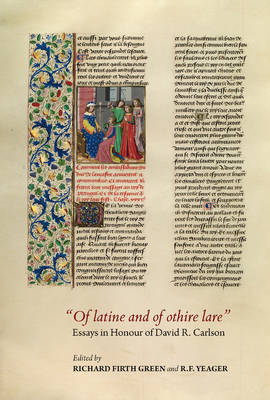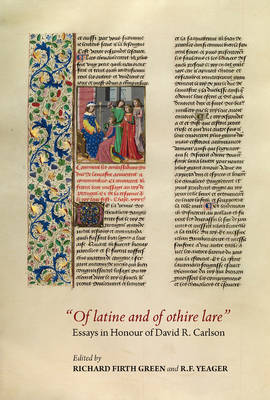
- Afhalen na 1 uur in een winkel met voorraad
- Gratis thuislevering in België vanaf € 30
- Ruim aanbod met 7 miljoen producten
- Afhalen na 1 uur in een winkel met voorraad
- Gratis thuislevering in België vanaf € 30
- Ruim aanbod met 7 miljoen producten
Zoeken
€ 145,45
+ 290 punten
Omschrijving
Unsurprisingly, in view of the remarkable diversity of David R. Carlson's own scholarship, the eighteen essays gathered here in his honour represent a corresponding variety of subjects across a broad range of countries and periods, but all drawing inspiration from his deep learning. Many are linked by their interest in Rome's intellectual legacy to the Middle Ages, the way, for instance, medieval readers understood Ovid (Frank Coulson and David Gura), or the use to which vernacular writers like Chaucer and Gower might put both Ovid (Richard Firth Green) and Statius (James Simpson). Some illuminate various aspects of Anglo-Latin works by authors like Walter of Peterborough (Stephanie Batkie), John Gower (Bob Yeager and Matthew Irvin), and Thomas Gascoigne (Michael Van Dussen), while others investigate the Latin discourse of fifteenth-century London (Rita Copeland) and of the great abbeys of St Albans, Glastonbury, and Canterbury (Andrew Galloway and James Carley). Further, several authors reflect Carlson's own interest in the social contexts of vernacular literary discourse, both English and French: Geoff Rector on Hue of Roteland, Andrew Taylor on Jean Froissart, Michael Bennett on John Gower, and John Scattergood on Charles d'Orleans. The collection concludes with two bibliographic studies (Julia Boffey on late fifteenth-century bills of fare and Ana Saez-Hidalgo on Katherine of Aragon's books), and with A.S.G. Edwards' brief life of the American editor of John Lydgate, Henry Bergen, a scholar who may have shared Carlson's left-leaning convictions but whose work was far less wide-ranging than his.
Specificaties
Betrokkenen
- Auteur(s):
- Uitgeverij:
Inhoud
- Aantal bladzijden:
- 378
- Taal:
- Engels
- Reeks:
Eigenschappen
- Productcode (EAN):
- 9780888448354
- Verschijningsdatum:
- 18/04/2022
- Uitvoering:
- Hardcover
- Formaat:
- Genaaid
- Afmetingen:
- 160 mm x 234 mm
- Gewicht:
- 725 g

Alleen bij Standaard Boekhandel
+ 290 punten op je klantenkaart van Standaard Boekhandel
Beoordelingen
We publiceren alleen reviews die voldoen aan de voorwaarden voor reviews. Bekijk onze voorwaarden voor reviews.











